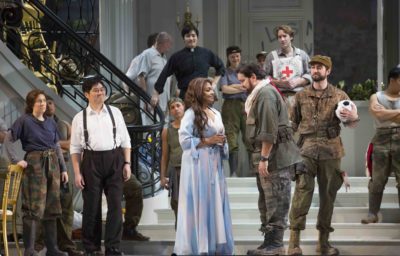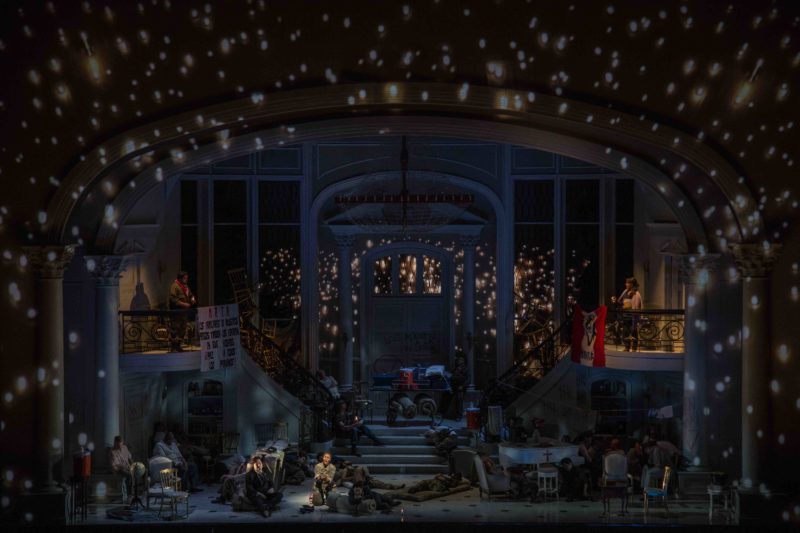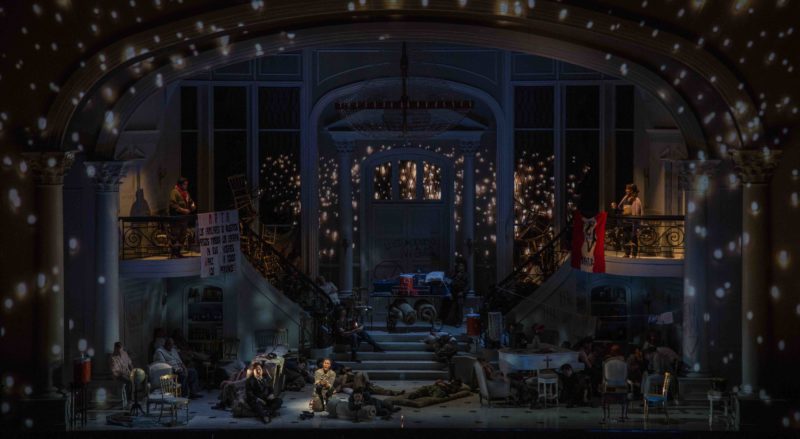INTERVIEW: PBS set to screen Jimmy López’s ‘Bel Canto’ opera Jan. 13

Bel Canto, the new opera from composer Jimmy López, will screen on PBS as part of the Great Performances program Friday, Jan. 13 at 9 p.m. World-renowned soprano Renée Fleming will host the production, which originally ran at the Lyric Opera of Chicago in late 2015 and early 2016.
The opera is based on the acclaimed novel by Ann Patchett. The story is a work of historical fiction based on a real-life hostage situation in Lima, Peru in the 1990s. Danielle de Niese plays an opera soprano who is in Lima performing when the crisis breaks out. She is stuck in a stately mansion with many other hostages for months as police and terrorists spar in and around the compound.
For López, who is a native of Lima, Peru, the opera was a 2010 commission that changed his life.
“Renée Fleming had just been appointed curator of Lyric Opera of Chicago … and one of her main projects was to create a new opera for Lyric Opera,” López said recently in a phone interview. “She had had this project in mind. She started looking for a composer, and that’s where I come into the picture. So I met her through a friend, who is a conductor. She apparently had a list of, I don’t know, 110 composers that she was considering for this project, and then I finally had a personal meeting with her.”
Fleming shared details with López about her intention to spearhead a project that would adapt Patchett’s novel into an opera. López received a copy of the book, was sent home to read the text and come up with some ideas. “It resonated with me immediately,” López said of the source material. “Of course, the story is fiction, but … it’s loosely based on real events that actually took place in Lima, Peru, between 1996 and ’97. I was living in Lima. I’m from Lima, Peru, and I was 18 years old at the time. So this hostage crisis was something I knew about very well, so even though Ann Patchett introduces a lot of fictional characters, there’s a lot of the original story that remains.”
After signing on for the project, the team around López began to assemble. Bel Canto has a libretto by Nilo Cruz, and the Lyric Opera production was directed by Kevin Newbury and conducted by Sir Andrew Davis. “Bel Canto was a game-changer for sure in terms of my exposure and my career path,” said López, who has also composed symphonies, concertos and chamber pieces. “I understood the weight of the commission and the exposure it was going to get. On the other hand, I could not wait to get started because I really felt really confident that I could deliver this project.”
As López sat down to compose the two-act opera, he focused on the lead character, opera singer Roxanne Coss (played by de Niese). By focusing on the obvious opera connection in the story, López was able to see Patchett’s story along musical lines. “I think actually it is based so strongly on operatic tradition and the transformational power of music,” he said. “So I really think the music is definitely the most powerful way to convey this story, and I found that really inspiring. Now, of course, in the book you have a lot of … composers and arias, and, of course, we didn’t really want to come up with a medley of that. So what we wanted to do was create original music for this opera, so we do make reference to a couple really famous operas. But other than that, all of it is original music, so that was also very important for us.”

While composing the piece, López tried not to lose sight of the overall structure. He wanted to musically portray the characters using a technique he calls “musical auras.” It’s a method of crafting music for individual characters and seeing them through a musical lens. Along these lines, one of his first compositions was Roxann’s first couple of arias in the opera.
“I didn’t write the opera chronologically,” he said. “She has three main arias in the whole opera. The last one happens at the very end of the opera, and that’s the last thing I wrote. But the other two that happen during the first act, those are the things that I wrote first. Definitely understanding and helping to define her character was really important for me at the beginning, so I could understand where the whole story was going to go. Also because in the opera you have musical themes that have to come back, have to make sense, so everything has to be connected as well. So it was really important for me to understand and know what her musical themes were going to be that I could weave into the fabric of the opera later on.”
The Lyric Opera of Chicago provided a tremendous amount of support and investment for the piece. The powers that be told López that he had the company’s full forces at his disposal, and he took advantage of that freedom. When viewers tune in to the Great Performances broadcast, they will notice a full orchestra and full chorus. He made Bel Canto relatively large in scope but not too large that future productions proved impossible because López wanted the piece to be accessible to other companies as well.
“I don’t want to go too crazy because I want it to be staged again,” he said. “But I did use the full orchestra, which is triple winds, a large string section, brass, and then I used a chorus, which I think if I remember well, like something like 48 people.”
A large cast was probably inevitable given the source material. He needed to have a chorus of guests at the party and a chorus of terrorists. Plus, he added a dozen named roles. Other additions included bird whistles that he included off stage for one of the arias and a conch-shell instrument native to the Amazon region of Peru. “So I gave one [of these Peruvian instruments] to one of the trumpet players,” he said. “Initially I wanted to give 10 or so. That would have been a little too much because doubling the orchestra does cost more. … So I would say that I actually didn’t feel limited at all, and every other crazy idea I might have had about adding instruments, they went it for it as well.”
When López composes, he tries not to overly rely on the piano. The cliche image of a composer furrowing his or her brow while sketching pencil notes on a sheet of music at a grand piano is not always an accurate picture. “This is something that I learned from my composition teacher in Lima actually when I was a student,” he said. ” I remember once bringing a piece to him for strings right, and then he said, ‘This does not sound good on the strings.’ I said, ‘Why?’ ‘Well, it totally sounds like you sat down at the piano and wrote it.’ He said, ‘What we have to do with you is we have to take you away from the piano.’ And we started writing songs.”
López admitted that composers, including himself, are unable to play all of the instruments in an orchestra, so it’s important that the compositions are idiomatic. He does use the piano to check harmonies and improvise, “but when you really want to transcribe those ideas to the instruments, it is better to stay as far as you can from the piano because you have to really think in the language of the instrument that you’re writing for,” he said.
When viewers tune in to Great Performances for the Bel Canto opera, which was filmed over two performances in January 2016, their experience will be different than those audience members who purchased tickets for the in-person event. López seems to enjoy the multiple ways that opera fans enjoy the artistic medium. Whether it’s radio, in person, on movie screens or on the television in one’s living room, the media possibilities have brought this trusted form of expression to new audiences unable to travel to opera houses (or afford their steep prices).
“Opera is a collaborative endeavor, so, yes, I write the music,” he said. “But I have someone who has written the lyrics. I have a director who has actually brought it to life, to a three-dimensional space. It’s incredibly rich in detail, so that’s what I like what Kevin Newbury did. He directed it with this broadcast in mind as well, so there’s a lot of gestures, small facial expressions that you would not be able to catch at the concert hall but that you will be able to see once you have a close-up.”
He added: “Of course, the music recording is amazing, so all the instrumentation comes through really well. I think it’s going to be a great experience for people to watch on TV because, yes, live there’s a different kind of energy, but there’s so much information in this piece. There’s so many people on stage all the time because it’s a hostage crisis. … I think the TV, the screening is going to help because that actually focuses your attention on what’s going on, what the important thing in the story is right now, musically and in terms of acting and all that. I think from that point of view, whoever watched the opera live is going to enjoy this even more, but whoever is watching the first time is going to get a very clear idea right away of what the opera is about and what the story is about. So I’m really, really excited to see it.”
By John Soltes / Publisher / John@HollywoodSoapbox.com
Bel Canto the Opera from Lyric Opera of Chicago will play as part of Great Performances on PBS Friday, Jan. 13 at 9 p.m. Click here for more information on the broadcast. Click here for more information on Lyric Opera of Chicago.

